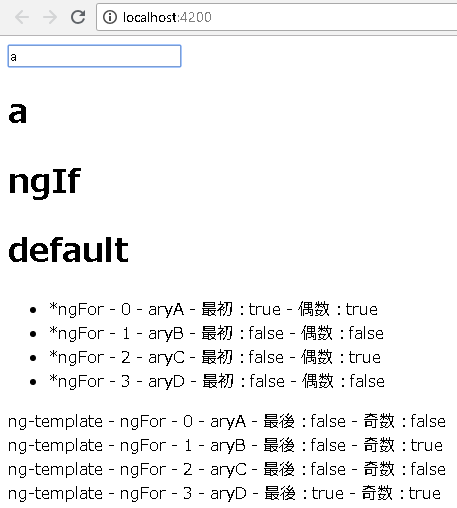Angular ngFor、ngIf、ngSwitch、ng-template
今回は ngFor、ngIf、ngSwitch、ng-template を使ってみます。Angular CLIの続きからやるので、環境がない場合、そちらを参考に環境構築してください。
サンプルソース
app.component.ts
import { Component } from '@angular/core';
@Component({
selector: 'app-root',
template:
`
<input #hello (keyup)="update(hello.value)" placeholder="メソッドの引数" />
<h1>{{hello.value}}</h1>
<h1 *ngIf="hello.value == 'a'">ngIf</h1>
<div [ngSwitch]="hello.value">
<h1 *ngSwitchCase="'aa'">
ngSwitchCase1
</h1>
<h1 *ngSwitchCase="'aaa'">
ngSwitchCase2
</h1>
<h1 *ngSwitchDefault>
default
</h1>
</div>
<ul>
<li *ngFor="let str of strs; index as i; first as isFirst ; even as isEven">
*ngFor - {{ i }} - {{ str }} - 最初:{{ isFirst }} - 偶数:{{ isEven }}
</li>
</ul>
<ng-template [ngIf]="bbb">ng-template ngIf</ng-template>
<ng-template ngFor let-str [ngForOf]="strs" let-i="index" let-isLast="last" let-isOdd="odd">
<div>
ng-template - ngFor - {{ i }} - {{ str }} - 最後:{{ isLast }} - 奇数:{{ isOdd }}
</div>
</ng-template>
`
})
export class AppComponent {
bbb = false;
strs: String[] = ["aryA", "aryB", "aryC", "aryD"];
update(val: string) {
this.bbb = val == "aaaa";
}
}
実行イメージ

ngFor
テンプレート(HTML)内でループを行う場合、ngForを使います。
import { Component } from '@angular/core';
@Component({
selector: 'app-root',
template:
`
<ul>
<li *ngFor="let str of strs; index as i; first as isFirst ; even as isEven">
*ngFor - {{ i }} - {{ str }} - 最初:{{ isFirst }} - 偶数:{{ isEven }}
</li>
</ul>
<ng-template ngFor let-str [ngForOf]="strs" let-i="index" let-isLast="last" let-isOdd="odd">
<div>
ng-template - ngFor - {{ i }} - {{ str }} - 最後:{{ isLast }} - 奇数:{{ isOdd }}
</div>
</ng-template>
`
})
export class AppComponent {
strs: String[] = ["aryA", "aryB", "aryC", "aryD"];
}
ダブルクォーテーションの外で変数を使う場合、let-(ハイフン)を付けます。
letはvarと同じように変数定義時に使用するもので、varは再宣言しても良くて、letは再宣言できません。
ngIf
テンプレート(HTML)内でIF分岐を行う場合、ngIfを使います。
import { Component } from '@angular/core';
@Component({
selector: 'app-root',
template:
`
<input #hello (keyup)="update(hello.value)" placeholder="メソッドの引数" />
<h1>{{hello.value}}</h1>
<h1 *ngIf="hello.value == 'a'">ngIf</h1>
<ng-template [ngIf]="bbb">ng-template ngIf</ng-template>
`
})
export class AppComponent {
bbb = false;
update(val: string) {
this.bbb = val == "aa";
}
}
ngSwitch
テンプレート(HTML)内でSWITCH分岐を行う場合、ngSwitchを使います。
import { Component } from '@angular/core';
@Component({
selector: 'app-root',
template:
`
<input #hello (keyup)="update(hello.value)" placeholder="メソッドの引数" />
<h1>{{hello.value}}</h1>
<div [ngSwitch]="hello.value">
<h1 *ngSwitchCase="'aa'">
ngSwitchCase1
</h1>
<h1 *ngSwitchCase="'aaa'">
ngSwitchCase2
</h1>
<h1 *ngSwitchDefault>
default
</h1>
</div>
`
})
export class AppComponent {
update(value: string) {
}
}
ng-template
テンプレート(HTML)内で実際のタグを使わず、Angularの処理を行いたいだけの場合、ng-templateタグを使用します。
import { Component } from '@angular/core';
@Component({
selector: 'app-root',
template:
`
<input #hello (keyup)="update(hello.value)" placeholder="メソッドの引数" />
<h1>{{hello.value}}</h1>
<ng-template [ngIf]="bbb">ng-template ngIf</ng-template>
<ng-template ngFor let-str [ngForOf]="strs" let-i="index" let-isLast="last" let-isOdd="odd">
<div>
ng-template - ngFor - {{ i }} - {{ str }} - 最後:{{ isLast }} - 奇数:{{ isOdd }}
</div>
</ng-template>
`
})
export class AppComponent {
bbb = false;
update(value: string) {
this.bbb = value == "aaaa";
}
}
ページのトップへ戻る